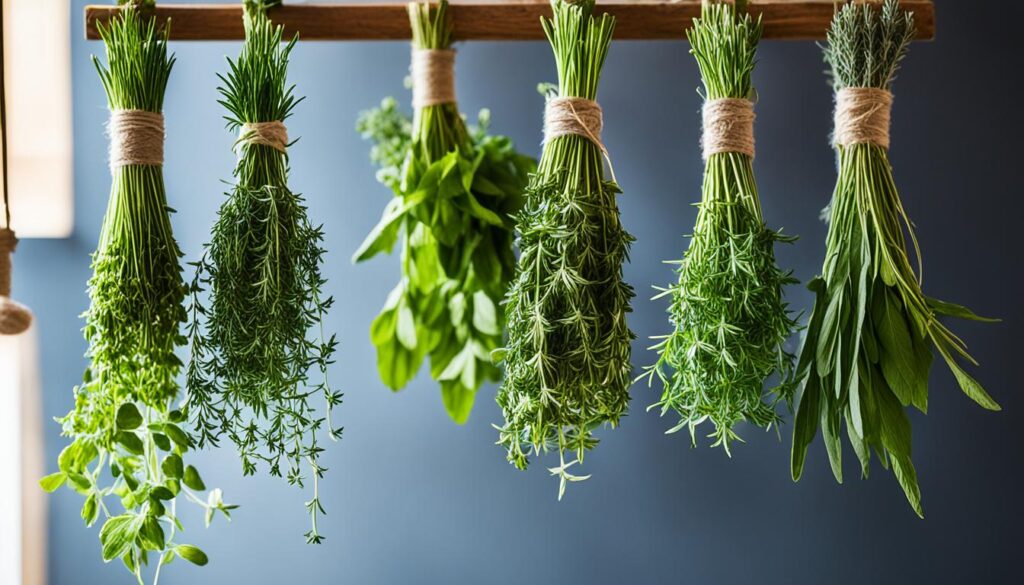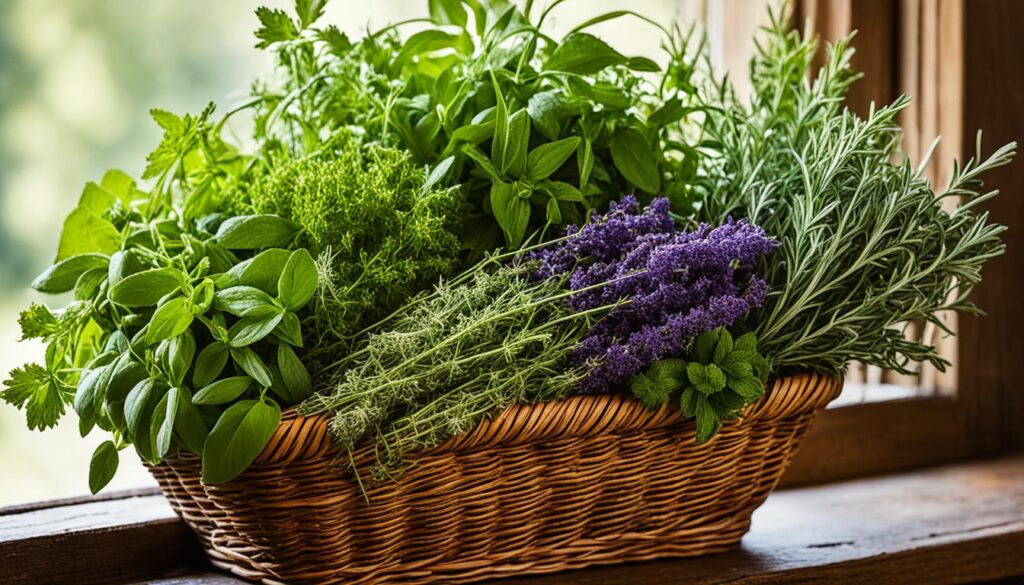Storing Fresh Herbs: Drying, Freezing, and Preserving Techniques
Ever found it hard to keep fresh herbs tasty and bright for more than a few days? Learn how to store and preserve your herbs with our detailed guide. We’ll cover drying, freezing, and long-term storage methods. These tips will help you keep herbs fresh and keep their flavor all year.
Key Takeaways
- Drying herbs in a food dehydrator or oven is a fast and easy way to preserve them for long-term use.
- Freezing herbs in layers, ice cubes, or olive oil helps retain their flavor and nutrients.
- Proper storage techniques, such as storing soft and hardy herbs differently, can extend the shelf life of your fresh herbs.
- Drying and freezing are the two best methods for long-term herb preservation.
- Certain herbs, like basil and cilantro, are better suited for freezing, while others, like rosemary and thyme, work well for drying.
The Importance of Preserving Fresh Herbs
Herbs have been a key part of food, seasoning, and medicine for centuries. They are most potent when their flower buds are just starting to show but haven’t opened yet. By preserving these delicate herbs, you can keep the life of your garden-fresh herbs going. This way, you can enjoy their amazing health benefits all year.
Why Preserve Herbs?
There are many good reasons to preserve herbs:
- Extend the shelf life of fresh herbs for year-round use
- Retain the intense flavors and aromatic properties of herbs
- Enjoy the importance of fresh herbs in your cooking and wellness routines
- Reduce food waste by preserving excess herb harvests
- Savor the health benefits of herbs throughout the seasons
Health Benefits of Fresh Herbs
Fresh herbs are full of health benefits. They have powerful antioxidants, anti-inflammatory compounds, and other beneficial compounds. These can help support your overall health. By preserving herbs, you can make sure to include these health-promoting ingredients in your diet and lifestyle all year.
“Herbs can be the key to unlocking the nutritional power of your meals.”
Whether you dry, freeze, or find other ways to preserve your fresh herbs, it lets you enjoy their health benefits and importance of fresh herbs all year.
Methods for Drying Herbs
Preserving the fresh, vibrant flavors of your homegrown herbs is key for any cook or gardener. There are several effective ways to dry herbs, ensuring you can enjoy their taste and smell even after the growing season. You can choose from air drying, using a dehydrator, or the oven, each with its own benefits.
Air Drying Techniques
Air drying herbs is a good choice, but it works best in dry places. You need temperatures over 85°F and humidity under 60% for air drying. If your area is humid, you might want to try other drying methods to keep your herbs tasty and fragrant.
Using a Dehydrator
A food dehydrator is a fast and simple way to dry herbs. Just set the temperature to 95-115°F, and your herbs will dry in 1-4 hours. This method keeps the herbs’ essential oils, which are key to their flavor, making dehydrator-dried herbs a great choice for cooking.
Oven Drying
Oven drying is another good way to preserve herbs like mint, sage, and bay leaf. Heat your oven to 110-130°F and lay the herbs out on a baking sheet. Dry them for 3-4 hours, watching to avoid overcooking. They should dry until they crumble easily and the stems break when bent.
Choosing the right drying method is all about keeping the herbs’ flavors and smells. With some trial, you’ll find the best drying method for your herbs and needs.
Freezing Fresh Herbs
Preserving your herbs’ flavor and freshness is key for any home cook. Freezing is a great way to keep your herbs fresh and ready to use for months. Learning how to freeze herbs in layers, ice cubes, or olive oil is easy and effective.
Freezing Herbs in Layers
Freezing herbs in layers is a simple method. Wash and dry your herbs, then lay them out in a single layer in freezer-safe bags or containers. After freezing, move them to airtight bags or containers. This keeps their shape and texture, ideal for soups and stews.
Freezing Herbs in Ice Cubes
Freezing herbs in ice cube trays is handy for adding flavor to meals. Chop or mince your herbs and fill ice cube trays. Add water or broth on top, then freeze. Once frozen, store the herb cubes in a freezer-safe bag. For a quick flavor boost, just add a cube to your dish.
Freezing Herbs in Olive Oil
Coating herbs in olive oil is another great way to freeze them. Chop your herbs finely and mix with enough olive oil to coat. Put the herb-oil mix in ice cube trays and freeze. The oil protects the herbs from oxidation, keeping their flavor and aroma.
Choosing any of these methods, frozen herbs add a great touch to your dishes. With a few easy steps, you can enjoy summer flavors all year.
Storing fresh herbs
Keeping your herbs fresh is crucial for their taste and aroma. Whether you’re a pro in the kitchen or new to fresh herbs, knowing the best ways to store fresh herbs is important. Let’s explore the key methods for how to store fresh herbs and keep them lively and tasty.
The Refrigerator: Your Herbs’ Best Friend
Most fresh herbs do well in the fridge, except for basil. Here’s how to keep them fresh:
- Wash the herbs gently and pat them dry with a clean paper towel.
- Trim the stems and place the herbs in a glass or jar filled with an inch or two of water, like you would with flowers.
- Cover the top of the container with a plastic bag or wrap to help retain moisture.
- Store the herbs in the refrigerator, changing the water every few days to keep it fresh.
This method can keep your herbs fresh for up to 10 days or more, depending on the type.
Basil: A Special Case
Basil is different from other herbs. Keep it at room temperature on the counter, with the stems in a glass of water, just like fresh flowers. This stops the leaves from turning black and wilting.
By using these easy herb storage techniques, you can enjoy the bright flavors of fresh herbs for a longer time. This will improve your cooking and make the most of your herbs, whether they’re from your garden or the store.

Storing Soft Herbs vs. Hardy Herbs
Knowing how to store soft and hardy herbs is key to keeping them fresh. Soft herbs like cilantro, dill, and parsley have soft stems and leaves. Hardy herbs, such as rosemary and thyme, have woody stems and tougher leaves. Each type needs its own way to be stored.
Soft Herb Storage
To keep soft herbs fresh, treat them like you would fresh flowers. Cut the stems, put them in a glass of water, and cover with a plastic bag. This keeps the leaves moist and prevents them from drying out. Keep them in the fridge and change the water every few days for freshness.
Hardy Herb Storage
Hardy herbs need different storage. Wrap their stems in a damp paper towel and put them in a sealed bag or container. This keeps them moist without making the leaves soggy. Store them in the fridge, and they’ll last longer than soft herbs.
Knowing how to store soft and hardy herbs is key to keeping them fresh and flavorful. By using these simple tips, you can enjoy the taste of fresh herbs for a long time.
Tips for Keeping Herbs Fresh Longer
Keeping herbs fresh and flavorful is crucial for your cooking. Whether you grow them or buy them, these tips to keep herbs fresh will help. They ensure you always have fresh, aromatic herbs for your dishes.
First, pick the right herbs. Look for ones that are bright green, without blemishes, and smell strong. Don’t choose herbs that are wilted or have spots, as they spoil quickly.
- Wash and dry the herbs well before storing. Moisture can make them spoil faster.
- Put the herbs in the fridge, either in water or wrapped in a damp paper towel. Change the water or towel often to keep them moist.
- Soft herbs like basil, parsley, and cilantro last about 2 weeks in the fridge. Harder herbs like rosemary, thyme, and oregano can last 4 weeks if stored right.
- Don’t keep herbs near fruits and veggies that produce ethylene gas. This gas can make herbs wilt and decay faster.
By using these easy tips to keep herbs fresh, you can extend the shelf life of fresh herbs. This way, you’ll enjoy their bright flavor and aroma for a longer time.

“Preserving the freshness of herbs is an essential skill for any home cook. With a little care and attention, you can keep your herbs vibrant and flavorful for weeks.”
Preserving Herbs for Long-Term Storage
Preserving herbs for long-term storage is easy and rewarding. You can dry or freeze them to keep their flavors all year. Each method has its own benefits for your cooking.
Drying Herbs for Long-Term Storage
Drying herbs is a great way to keep them fresh for a long time. You can store dried herbs in the fridge or freezer for up to a year. They will still have their strong flavors.
To kill insects and make sure they’re safe, heat the dried herbs at 160°F for 30 minutes. Or, use 175°F for 15 minutes. Freezing them at 0°F or below for 48 hours also works well.
Freezing Herbs for Long-Term Storage
Freezing fresh herbs is another excellent method for long-term storage. They keep their taste and can be used straight from the freezer or after thawing. You can put them in airtight containers or freeze in ice cube trays with water or olive oil.
Choosing to dry or freeze your herbs means you can enjoy their fresh flavors all year. With some planning, you can use the herbs from your garden or the market for many seasons.
Best Herbs for Drying and Freezing
Preserving fresh herbs can be tricky, but knowing the best methods can make a big difference. Whether you’re drying or freezing, picking the right herbs is key. This ensures you keep their flavor and aroma.
For drying, rosemary, thyme, oregano, and sage are top choices. They keep their taste and smell well when dried. But, basil, cilantro, and chives freeze better because they lose their color and flavor when dried.
- Best herbs to dry: rosemary, thyme, oregano, sage
- Best herbs to freeze: basil, cilantro, chives
Some herbs, like fennel and scented geraniums, dry better than freeze. Drying keeps their unique tastes and smells, while freezing can dull them.
When saving your herbs, think about how you’ll use them. Dried herbs are great for long storage and cooking. Frozen herbs are perfect for adding fresh taste to sauces and pestos.
Making Herbal Vinegars and Tinctures
Preserving fresh herbs is easy with herbal vinegars and tinctures. These methods let you enjoy your garden’s flavors all year.
To make herbal vinegars, put your favorite herbs like basil, oregano, rosemary, dill, garlic, thyme, or sage in vinegar. This process extracts the herbs’ essential oils and compounds, making a tasty condiment or marinade.
Herbal vinegars are a good choice if you want to avoid alcohol. Unlike making herbal tinctures, which uses alcohol, vinegars offer a similar way to preserve herbs without alcohol.
“Herbal vinegars are an easy and inexpensive way to preserve fresh herbs year-round.”
Choosing to make vinegars or tinctures lets you preserve herbs in vinegar. You can enjoy their health benefits all year. Try different herb mixes to make unique blends for cooking and health.
Herb Preservation Troubleshooting
Storing and preserving fresh herbs is key to keeping their flavor, aroma, and nutrients. But, even with care, herbs can spoil or become unusable. Knowing the signs of spoilage and common mistakes can help you save your herbs.
Signs of Spoilage
If your fresh or dried herbs look or smell off, they’re likely spoiled. Look out for these signs:
- Discoloration, such as yellowing or browning leaves
- Sliminess or mushiness in the texture
- An unpleasant, musty or rotten odor
Dried herbs that have lost their color and smell are also spoiled and should be thrown away.
Common Preservation Mistakes
Steering clear of common preservation errors can keep your herbs fresh longer. Some big mistakes include:
- Storing herbs in areas with too much moisture, oxygen, or light
- Failing to properly wash and dry herbs before storage
- Using the wrong storage containers, like zip-top bags or plastic wrap
- Freezing herbs without the right precautions
To check if dried herbs are bad, look at their appearance, smell, and feel. Drying and storing herbs in airtight containers in a cool, dark spot is crucial. This keeps their quality and prevents spoilage.
Being aware of spoilage signs and avoiding common mistakes keeps your fresh and dried herbs fresh and tasty. With the right methods, you can fully enjoy your herb-infused dishes.
Conclusion
Preserving herbs is a rewarding way to enjoy their fresh taste all year. By learning to dry, freeze, and preserve them, you can keep their health benefits. This lets you enjoy their vibrant flavors even after the growing season ends.
Storing herbs right is key to keeping them fresh. You need to control moisture, oxygen, and temperature. This guide offers many tips to help you store your herbs well.
With the knowledge and methods here, you’re ready to preserve herbs like a pro. Embrace the art of preserving herbs. Enjoy the flavors of your garden all year.
FAQ
How long does it take to dry herbs in ovens or food dehydrators?
What are the benefits of preserving herbs?
What are the best methods for drying herbs?
How can I freeze fresh herbs?
How should I store fresh herbs?
How do I store soft herbs versus hardy herbs?
What are some tips for keeping herbs fresh longer?
How can I store dried and frozen herbs for the long-term?
Which herbs are best for drying versus freezing?
How can I preserve herbs in vinegars and tinctures?
How can I tell if my preserved herbs have gone bad?
Source Links
- https://extension.umn.edu/preserving-and-preparing/preserving-herbs-freezing-or-drying – Preserving herbs by freezing or drying
- https://www.almanac.com/preserving-herbs – Preserving Herbs: Drying Herbs and Freezing Herbs
- https://www.themediterraneandish.com/how-to-store-fresh-herbs/ – Best Way to Store Fresh Herbs (2 Easy Methods)
- 10 Must-Have Blooms for Your 2025 Garden
- The Health Advantages of Gardening You Need to Know
- How to Create a Small Vegetable Garden Layout Plan: A Beginner’s Guide
- DIY Garden Projects for Small Spaces: Upcycling Ideas to Maximize Your Garden
- Watering Techniques for Small Gardens: Ensuring Your Plants Thrive
- Small Border Plants for Landscaping: Adding Beauty and Functionality to Your Garden
- Year-Round Small Space Gardening: Seasonal Planting Tips for Maximum Harvest
- Essential Tools for Small-Space Gardening: What You Really Need
- The Ultimate Guide to Container Vegetables: What to Grow in Small Spaces
- Budget-Friendly Gardening: How to Create a Thriving Garden on a Tight Budget
- How to Optimize Sunlight in Small Gardens: Tips for Better Plant Growth
- DIY Vertical Planters: Creative Ideas for Small Space Gardening
- Companion Planting for Small Vegetable Gardens: Boost Growth and Deter Pests
- Container Gardening Essentials: Choosing the Right Pots, Soil, and Plants
- Vertical Gardening Techniques: Maximizing Your Small Space with Climbers and Vines
- How to Build a Raised Bed Garden in a Small Backyard: Step-by-Step Guide
- The Best Vegetables for Small-Space Gardens: High-Yield Varieties You Need to Grow
- Smart Vegetable Garden Layouts for Small Spaces: Maximizing Your Green Thumb in Compact Areas
- 40. Best Practices for Managing a Sustainable Garden Year-Round
- Building a Wildlife Pond for Biodiversity
- Advanced Techniques in Sustainable Gardening
- How to Create a No-Till Garden
- The Mental Health Benefits of Gardening
- Using Technology to Enhance Sustainable Gardening
- Getting Certified Organic: Steps and Benefits

Leave a Reply